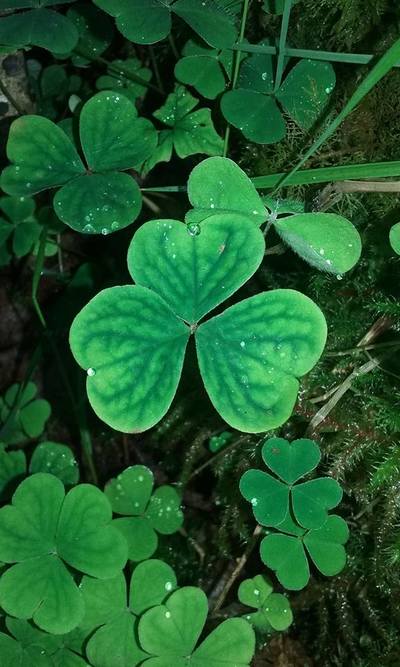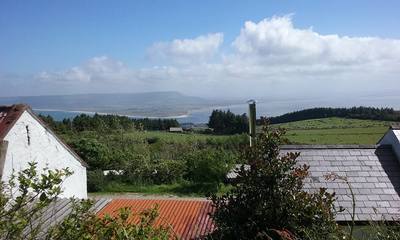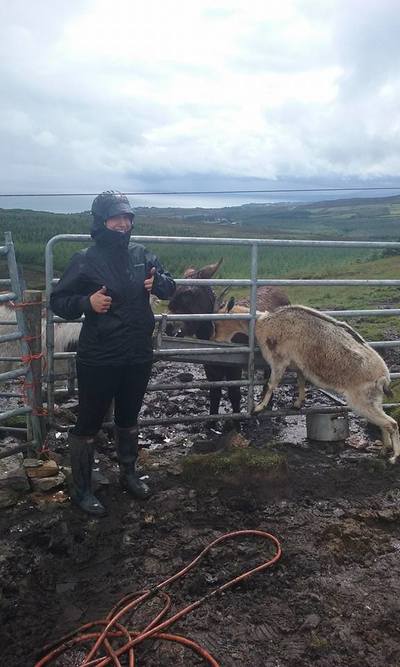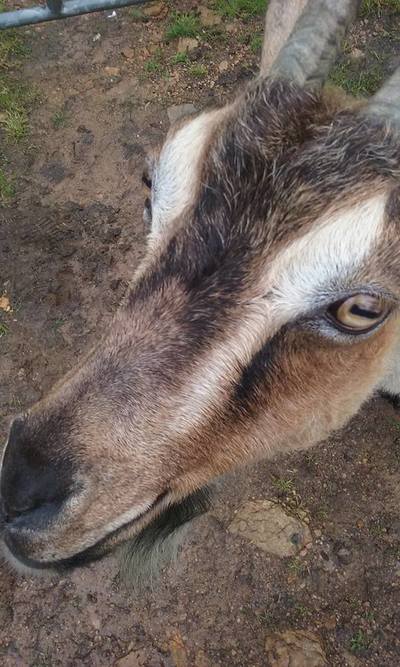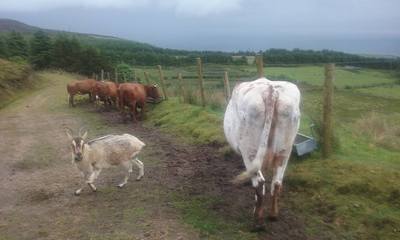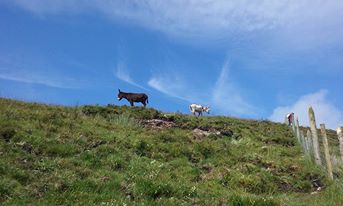|
"Perhaps my best years are gone...but I wouldn't want them back. Not with the fire in me now." -Samuel Beckett - Creative Non-Fiction - Queenie watched from the top of the heap; safe and clean on the tarp. I looked up at her, her lower jaw jutting out with tiny criss-crossed bottom teeth, her calico fur collecting water droplets from the misty morning air. I took my pitchfork and stabbed it into the manure, forking it into my wheelbarrow. A quiet meow, and she took off. I kept at it, clumps of shit and hay occasionally falling into my Wellies. Shin-deep in a concoction of poop, hay, and mud. Compost piled higher than my head. With the wheelbarrow filled, I pushed out of the compost pile, cautiously stepping around the nettles, and headed back down Upper Ballyhagen to the potato fields on the lower part of the farm.
I passed Lorenzo - an Italian kid volunteering on the farm - on his way up to the compost heap with his empty wheelbarrow. Nicholas and Eva - two teenagers from Montreal - had left the day before, and our arms, back, and legs were leaden with envy. "How many more?" I asked on my way down. "I think it is, uh, 20 more, no?" "Ugh. I can only smell poop." "Oh my god. It is all shit. Everything is shit. So much shit!" We walked off in our opposite directions. Wheeling down the road was easy. Wheeling up the road was less so. Doing it a dozen times in between filling the wheelbarrow, and spreading the manure between the potato plants was exhausting. Still I smiled. The sides of the road were covered in buttercups, nettles, and violently magenta foxglove. It was cloudy and drizzly that morning, and I could just make out the coast of Northern Ireland across Lough Foyle. The Fowler Farm sits on top of the highest hill in Greencastle, County Donegal. It looks down over the two-pub, one-store town with a view to slay for. Greencastle is in the Republic of Ireland, situated on the Innishowen peninsula just across the lough from Northern Ireland. On sunny, clear days you can see all the way to Scotland. Or so I was told. I veered right with the wheelbarrow, and pushed it through the metal cattle gate. Molly popped up from behind a mass of buttercups, and gamboled over. She was some sort of border-collie mix, overweight, a bulging cancerous bump on her nose. She and Dehlila, a black lab mix, would keep me and the other volunteers company out in the fields during the day. Chasing the rotten potatoes we would throw across the field, the clumps of dirt and manure we would throw at each other, barking at the boys when they would have lightsaber fights with the hoes and rakes. Molly jogged alongside, wagging her tail, looking up at me, her open panting mouth like a smile. I wheeled over to the rows of adolescent potato plants, their broad green leaves waving gently in the light wind. Christina - an environmental studies student from Austria - met me at the top of one of the rows, and began forking out the compost and spreading it between the plants. We worked in silence. The physicality of our work making our usual singing and shenanigans an unnecessary exertion. Once my wheelbarrow was empty I turned around to head back up the hill, passing Lorenzo again as he entered the field. We carried on for several more hours. Peeling layers when the drizzle would stop; piling on when it started back up. My body felt heavy. My shoulders tense from pushing up the steep farm lane. I wandered in and out of thought; short fragmented musings, forcing their way through the hypnosis of manual labor. Reminiscing, pondering, worrying, fantasizing, flowing, forgetting. In the initial stages of planning this trip I had considered WWOOFing (Willing Workers on Organic Farms – opportunities to work on farms for free in exchange for room and board). Hours spent pouring through guidebooks and blogs lead me to decide on hostel hopping instead. I decided to tour the whole island, Northern Ireland and the Republic. It was Dublin - the first leg of my trip - that changed my mind. Six days in the land of Joyce, Yeats, Wilde, Berkley, the Dubliners, the Pogues. Viking castles, the Book of Kells, museums with hazelnut shells dating back to the time of the Neanderthals. Trinity College, Grafton Street, Temple Bar, the River Liffy. I had idealized these things in my mind, believing that Dublin would be a place lost in time. But the reality hit me upon landing: dirty trash covered streets and sidewalks smelling of piss and sick, a hostel full of teenagers traveling just to get drunk somewhere new, tourists taking pictures on their iPads just to prove that they walked past something someone else might recognize, general big city-ness. Dublin had me down, questioning whether I would love Ireland as much as I thought I would, or if I had spent the past sixteen years romanticizing a version of it that didn't actually exist. I longed for the emerald of this allegedly emerald isle. By the sixth day of perusing museums and holding back girls' hair in bar bathrooms, my mind refused to absorb any more information, and my feet dragged along the sidewalks. On the seventh day, I boarded the train, and set off for the west coast fishing village of Dingle by way of Tralee. A half hour later and the city gave way to quilted expanses of every shade of green imaginable. Flowers, patchwork stone fences, monstrous clumps of twisting trees sprouted and shot up out of the kelly green fields. The train sped through the country, nature sped into existence, and I sped into its wild domain. My mind cleared, eyes widened, heart beat faster. I exhaled for the first time in a week. In the afternoon we hoed up rows of dirt to be planted with baby kale and parsley plants. Hours spent bent over the earth, raking and hoeing; standing to straighten our backs, wipe the sweat from our faces, stare out into the distance for a moment. By day's end we had tilled and rowed nearly an acre of land. I carried the rakes to the large green tool shed, and plodded slowly to the feed shed. Five cats lived in the feed shed. It reeked of ammonia and oat pellets. With the dull metal scoop, I filled the bucket with pellets for the cows. The other bucket I filled with leftover communion wafers for the donkeys. This was my last time feeding the animals. I’d be leaving the farm the next day, and leaving Ireland in a week. I came around the corner of the shed, and headed up the muddy hill to the pasture. The six brown and white cows stood at varying intervals on the top of the hill, staring down at the gate, watching my approach. Fairport, a goat’s goat if there ever was one, paced back and forth, periodically maneuvering his head and horns between the metal bars of the gate to hurry me along. I climbed the gate, and jumped down; Fairport trying his best to ensure my falling and subsequent spilling of the feed. He nudged me all the way to the troughs, trying to stick his bearded mouth in the buckets as I walked. Poor guy didn’t stand a chance of sneaking feed once the cows came down. I pushed Fairport away as I looked down at the quilted countryside; flooded with love for the land, and heavy with the burden of returning home. Back to the city. Back to the suburbs. Fairport nibbled on my sleeve, nudged me with his head. I gave him a scratch between the horns, and turned back down the hill. |
Want to support my delusions of being a paid writer and philosopher? Check out any of the options below to make a donation.
Venmo: @alessandra-ragusin PayPal: PayPal.Me/agragusin Archives
May 2020
© Alessandra Ragusin 2016-2020
|
